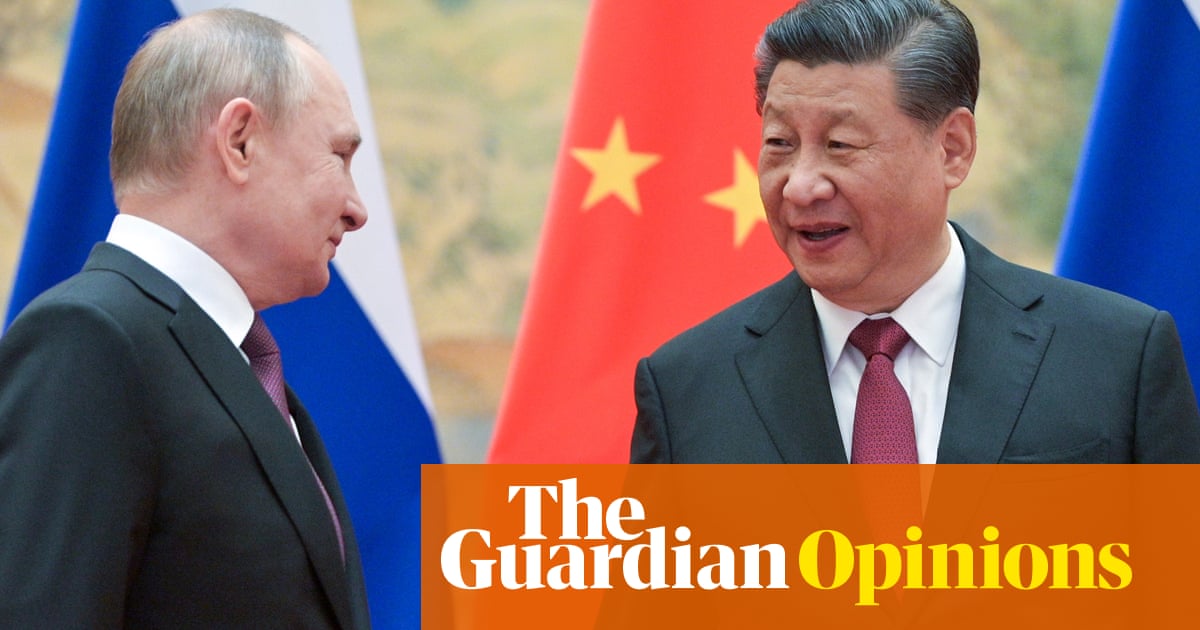War in Ukraine is a severe test of China’s new axis with Russia
Show caption Vladimir Putin and Xi Jinping at their meeting in Beijing earlier this month. Photograph: Alexei Druzhinin/Tass Opinion War in Ukraine is a severe test of China’s new axis with Russia Yu Jie Beijing will tread carefully, and weigh up whether its strategic alliance with Moscow is worth the cost of this reckless invasion Fri 25 Feb 2022 15.00 GMT Share on Facebook
Share on Twitter
Share via Email
President Vladimir Putin’s full military escalation in Ukraine has unsettled his seemingly best friend in international affairs, the Chinese president, Xi Jinping, who has invested in the bilateral relationship personally and politically. Beijing’s axis with Moscow was recently strengthened during the 2022 Winter Olympics, with their joint declaration to proclaim “their cooperation with no limit”. The western foreign affairs community then rushed to conclude that Moscow and Beijing were forming – if one had not already been formed – a “strategic alliance” aimed at destabilising the liberal, rules-based world order. Some in the west assume Beijing will inevitably support Russia’s military actions in Ukraine.
However, cooperation would have to come with some substantial limits to avoid undermining Beijing’s own priorities and interests in the eyes of Chinese foreign policy planners. For various reasons, the Kremlin’s latest military exercise is both a conundrum and a source of equally unexpected opportunities for Beijing.
In line with a difficult balancing act, the Chinese foreign minister, Wang Yi, had publicly stated that all countries’ sovereignty and territorial integrity should be protected, including Ukraine’s; and Russia and Ukraine should return to the negotiating table. That is widely regarded as the most clearcut position China has delivered on the current situation and was echoed by a phone call between Xi and Putin today.
China’s stance crystallises two elements: first, it does not support the Kremlin’s move against Ukraine, and views Moscow’s actions as a violation of national sovereignty and the UN charter – one of the cardinal principles of Beijing’s foreign policies since 1949. Second, and most important, China strongly implies there is no comparison between Ukraine and Taiwan – the former is a sovereign state and the latter is not a full UN member but a unique polity, seen as a renegade province by Beijing. But China will carefully watch the west’s willingness and resolve to respond to the situation in Ukraine, which may well serve as a reference to Taiwan later.
The Kremlin’s military adventurism will also damage China economically to some extent. As Russia’s biggest trade partner, China has significant investments and financial ties with Russia that will be exposed to the west’s sanctions. Such sanctions most certainly come with an acute pain for many fossil fuel-focused state-owned enterprises. Equally, Beijing is Kyiv’s top trade partner, and has enjoyed friendly ties with Ukraine, which is a source of grain and military equipment.
Nonetheless, Beijing will measure its reaction to Ukraine through the lens of US-China competition. To this end, the Ukraine crisis provides two unexpected opportunities for President Xi. China views the Ukraine situation as a timely distraction that will draw the US away from the Indo-Pacific region and back to Europe, at least prior to the US midterm elections in November. This offers an unexpected sigh of relief to China as the primary strategic rival to the US. Without deliberate coordination, Beijing and Moscow have already acted as force multipliers to undermine the US’s capability through their individual actions.
It is correct to assume that Russia and China see world affairs in a similar light, not least in their antipathy to liberal values. Deepened bilateral cooperation allows the two countries to demonstrate great power status on the world stage, either to counterbalance the dominance of the US or to further their own geopolitical aims.
However, Beijing will have to consider the balance sheet for this current alignment carefully. If the cost of alignment comes at a far greater price than the actual benefit, Beijing must reach its own conclusion and tread carefully.
Beijing hoped that Russia would offer full diplomatic support to its various global initiatives under a plethora of UN-led platforms, in the context of competition with the US. But Moscow’s current move has made China’s wishes more problematic. Russia’s recklessness serves as a spur for China to rethink its return on its alignment with the Kremlin, and it may wish to minimise the risks associated with Russia’s fraught relations with the west. China may well prepare a discreet course correction to soften its harsh diplomatic rhetoric, and a pathway of less hostile ties with the west to demonstrate its maturity in dealing with a major world crisis.
History does serve as a good lesson for the Chinese Communist party: Nikita Khrushchev withdrew all assistance to support China’s nascent industrial development because Beijing refused to become a junior partner of Moscow in political and military terms in the 1950s. The Sino-Soviet split of the 1950s and 60s took place in a very different world, but its spectre remains alive in Beijing and Moscow, and is unlikely to be exorcised in the near future.
Dr Yu Jie is senior research fellow on China at the Asia-Pacific Programme of Chatham House











